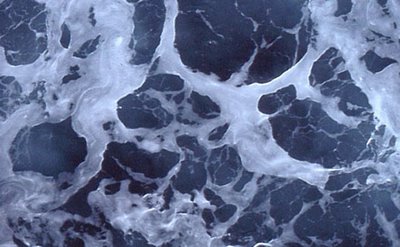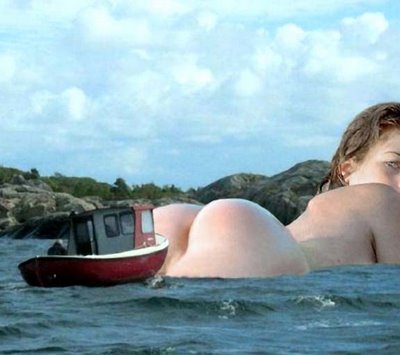High Tide's Lowest Throne

The full moon rounds
its Southern cape at this hour,
sailing across the lowest
surges of the northern sky.
It’s an eighteen-year event.
What is it when lunar
fullness is at lowest ebb,
eclipsed by its own sky?
What is that strange hue
to this July’s moon,
most lost when days
are wildest with summer’s
raging sun, most profound
for what it ballasts in
my sleep, lamped from
a Southern depth
where old magic is and
yet can’t be,
a haunted, merry,
daunting realm
weirder somehow
than the sea god’s
virile north.
The roaring of what’s
furthest south
is what tall ships
dread, but still they
must head that way
to ferry all hearts home.
Down there, beyond
her scything gales,
a naked queen
stares at me with
just her head above
the blue, her eyes
most wild for what
I cannot see, as
icebergs wheel
the laced white
prows of lunar
continents grinding
up the ocean floor.
She smiles, lifting
slowly from the wake
as the moon falls lowest
in the west -- it will
take her 18 years to
fully emerge. She is
thus my companion
for the next voyage
I write: Neck and shoulders
dripping blue for years;
then a long season
of that devil cleavage up
and out, a V-trope
enough to teat two moons
(the one we see,
the other we are)
savagely proud and indecent,
nursing galaxies on her
starry milk. Nine years from
now she’ll stand colossal
off that Southern cape,
the deepest ocean surging
cross her ankles, the moon
at zenith set in the silver
diadem she wears atop
her head. She is the hidden
anima of every too-full moon,
the sign of every cusping wave
about to crash and spill
wild foam across all shores.
Today she is enthroned
below, fullest in every way
we’ll never see or say
or know much more about
and a happy sum at that.
She is lowest here in
her high tide, deepest in
the full moon’s lowest ride,
a charm wound tight
and spurted from those breasts
just as the moon slips
beneath black western
trees, quelling this black pen.
Of her blue solstice
of rewombed moon
I praise with this amen.

But how could we reach our long-promised homes without encountering Cape Horn? By what possibility avoid it? And though some ships have weathered it without these perils, yet by far the greater part must encounter them. Luckily it is that it comes about midway in the homeward-bound passage, so that the sailors have time to prepare for it, and time to recover from it after it is astern. But, sailor or landsman, there is some sort of Cape Horn for all.
-- Melville, White-Jacket

GIANTESS
2004
I am Cupid’s WMD, a
Catapult of blue breasts. The skulls
Of my scooped-out lovers line the
Mazes of my cave, far beneath
The rolling sea. By day I dream
Of your cock and balls in this mouth
Of stone; by night I feed, tapping
O so gently my suckered limbs
Against your window panes, calling
You out to drown my way. My rule
Has lasted here some four hundred
Million years, yet every dusk which
Darkens abyss I wake afresh,
Starved wet in uncoiling desire,
Beak snapping for your milk of fire.

SCRIMSHAW
2005
I write down all the feral ways I
kept losing and finding her through
Capes of blueblack toil upon a
woman’s bared and bent over ass,
the that pale sweetness forever
spilled, like milk, across this page.
No oil of the whale or ink from
any pen can fully sound that
wicked ambrosia all the way down
to her abyssal bed beneath the
frenzy of all days inside the
bootless rage. For years now I’ve
daily written my way from one
of those cheeks to the other,
crossing over a crevice of dark
delightedness dank and dripping
down to fur elysium. Years and years
to name the requital of a greed,
each poem a whaleboat on a sea
in which she rises and rouses
with legs spread wide like jaws
inviting yet another plunge
into the whitemost plasm
which ferries wombs to tombs
and gleams there evermore.
Would these scratches of lost ink
be teeth enough to batten on each
paper cheek the way she bit me
hardest, clean through my leftmost
leg! Some day I’ll say enough
to make that ass a peg for
walking on; then I’ll get on
through the Cape at last, its
salt sashay of pure in and outwardness
screwed like a fish to my knee.
does any of this make sense to you?
Today the verse is dark and strange,
perceiving darker fathoms of design
beneath the work, a purpose not my own.
My beloved’s ass a tooth or bone
on which I scratch all poems? Egads!
Who needs real ejaculate
when such froth whitecaps the wave
with such assworthy foam?

ORAN AND THE GIANTESS
2004
You found here sleeping in that cave
Which fonts the western sea, below
All depths I dream. Kissed her gently
As a shade and watched her stir and
Sigh and slowly open her deep
Eyes. She whispered your name as you
Climbed in next to her, singing
All the while. What happened next you
Would not say, except to smile that
Dolphins and sea horses pranced round
The bed while sea-blooms widened to
Hurl wavelike a wild blue perfume.
You drank in draughts the distillate
Of her salt souterrain, till dawn
Awoke me startled here, blank page
Beneath, and pen like her in hand.
My joy’s your shore, this crashing land.

The figure of Adamastor appears in Canto V of The Lusiads of Camoens (1512), when Vasto da Gama and his fleet approach the Cape of Storms ((Cape of Good Hope)) on their voyage to India. A cloud in the shape of a monstrous being suddenly towers over them.
Even as I spoke, an immense shape
Materialised in the night air,
Grotesque and enormous stature
With heavy jowls, and an unkempt beard
Scowling from shrunken, hollow eyes
Its complexion earthy and pale,
Its hair grizzled and matted with clay,
Its mouth coal black, teeth yellow with decay.
...
The giant reproaches the Portuguese sailors for intruding into his domain, and prophesies shipwreck, catastrophe and death for all those bold enough to sail around the Cape.
In the famous passage of the “epic curse”, he threatens to unleash his fury on those who come after Da Gama. When Da Gama demands to know who the monster is, he replies bitterly: “I am that vast, secret promontory/ You Portuguese call the Cape of Storms...”
Then follows an account of Adamastor’s unhappy fate. He used to be one of the giants of Olympus, he says. He fell in love with a beautiful, seductive sea nymph called Thetis, but she was repulsed, by his extreme size and hideous looks.
Thetis’s mother Doris promised to arrange a tryst for him with her daughter. One, night, as Doris had sworn, Thetis appeared. The passionate giant ran towards her and took her in his arms, only to find himself embracing a rock. He was transformed into the Cape – into Table Mountain, to be precise.
From the earliest times, the journey down the west coast of Africa was presented as a descent into hell, a nightmarish region where dogheaded or headless monsters were thought to live. It was believed, until the time of Dias, that anyone venturing into the “torrid zone” would be consumed by flames.
-- “The Myth of Adamastor Revisited,” Cyrill Coetzee. Cyril Coetzee’s account of the beginnings of his painting T’kama-Adamastor which appears in T’kama-Adamastor: Inventions of Africa in a South Africa, a book of essays on the painting and theme, edited by Ivan Vladislavic and published by the University of the Witwaters and
appears in The Sunday Independent (Johannesburg, South Africa), 12/3/2000

PROMENTORIUM
PRASSO
2005
Surely I am tomorrow’s fool,
a savage bark of inquiry
transgressing further south
than any boat like this
has ventured to
without going down in howls.
My style outre to my age
and education, holds faith
in rigging which went out
with steam engines and
to nuclear reactors is more
than merely quaint, but is
an outrageous dalliance
with skulls as old as Oran’s
whose fish-tail is spines
all seas. Yet such a voice
conceits a way further
down the coast than all
have gone before, finding
there a cape southernmost
of all, a promentorium prasso
which holds one world on
its shoulders and guards the
door to this other which
you cannot enter without
losing all your learned before
of song and love and God.
Day after day the big
music howls and no else
can heart it, forcing me
to wonder whether I’m
not just mad and stupid,
navigating a course of
high angelic-ire round
the ass-end of awed sounds.
Voices accuse me in the boom
of waves collapsing everywhere:
lone wolf, dead-ender, ventriloquist
and dummy of blue nothing,
betrayer of all gods ... A choir of
sickly ichors howl inside this
downward course which all
poems descend but stop at
saner more commercial ports
I left so long ago, on to discover
basser basso cleffs, tones lower
than the last island at the left
end of pianos, beneath all
frets and stops, around the
vox humana’s be-all-end-all Cape
and into what may be stranger
songs than have yet been sung,
newer and older than all the
world has learned and since forgot.
Titan voices are woven in these
hours, awful hoots and hollars,
shrieks and wild orgasmic Yesses,
a maddened Cape of Storms
no one’s found apt words for,
much less lived through to
sing what came when huge
wings fold and plunge through
sweet blue shining waters.
Future hours may see this one
clearly, but today it’s wind
and mist and ice floes every way,
waves like brontosaurii swooning
every which way on the prow.
This instrument they hand
me foretells a music not heard
on earth for ages, perhaps not
ever, at least to human ears.
The view is southernmost
and rude, then north in every
forward shining way.


<< Home